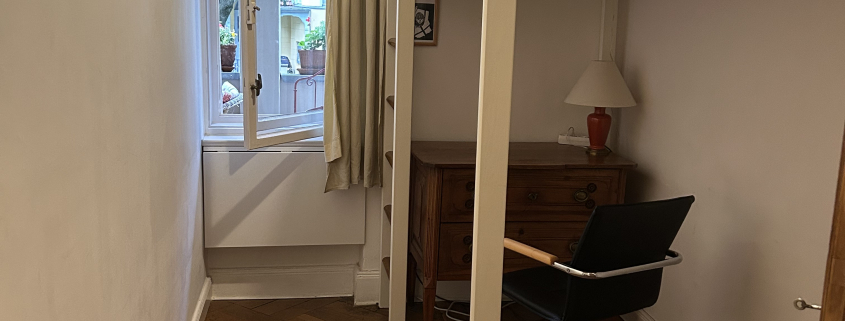I Knew There Was a Catch
/in Dublin, Ireland Fall 2025So, apparently, studying abroad means that you are actually supposed to go to classes and participate in other academic endeavors. I know, I’m as shocked as you are… Yes, yes, yes, obviously I’m joking, but, based on the fact that I’ve had zero homework as of week three, I sometimes wonder. Unlike in the US, where students are constantly bombarded with daily assignments on top of bigger projects that loom in their future, students here have only a few bigger assignments to worry about throughout the semester. This, however, poses a few problems for yours truly.
Firstly, without frequent homework to keep me on task with my learning, I fear that this academic weapon is apt to rust. Don’t get me wrong, I dislike homework just as much as the next guy, but I am really beginning to understand the worth of having some. Not having homework as a reference for how well I’m understanding the material and what I need to study for future assessments makes it difficult to keep on task. People preach the importance of self-regulation and motivation, myself included, but putting those into practice is a whole lot harder than one might think. It’s a lesson in which I am desperately trying to get a passing grade. Yes, I’ve been known to knock back a whole novel in a day, but it takes a special person to truly comprehend, let alone enjoy, reading multiple lengthy excerpts about medieval Irish documents without having an assignment to complete as a reference while reading. (Insert picture of South Campus just because I could definitely read a few novels there.)
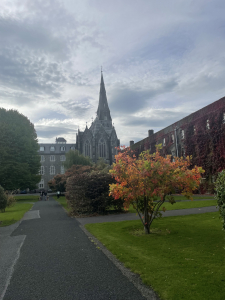 Luckily for me and my procrastination tendencies, I only have each class once a week, which leaves me a good five days to think about doing the readings before doing them the night before the class. I’m only joking…mostly. Another saving grace is that I really enjoy my classes, as I’m able to take electives that genuinely interest me. I’m taking classes such as ‘Emigration in Nineteenth and Twentieth Century Irish Society’ and ‘Cultural Heritage and the Irish Literary Tradition’, along with a few other ones that I actually need to take for credit. It’s been interesting to take classes such as ‘American History’ or other methodology classes, such as ‘Teaching PE’, from the Irish perspective.
Luckily for me and my procrastination tendencies, I only have each class once a week, which leaves me a good five days to think about doing the readings before doing them the night before the class. I’m only joking…mostly. Another saving grace is that I really enjoy my classes, as I’m able to take electives that genuinely interest me. I’m taking classes such as ‘Emigration in Nineteenth and Twentieth Century Irish Society’ and ‘Cultural Heritage and the Irish Literary Tradition’, along with a few other ones that I actually need to take for credit. It’s been interesting to take classes such as ‘American History’ or other methodology classes, such as ‘Teaching PE’, from the Irish perspective.
Another thing that has proved to be a challenge for me is the Irish communication style and how it conflicts with what I know. Yes, I will explain that thought. What I mean is, unlike in the US, where the professors are fairly clear about what they expect for assignments and where and when things are, the professors here often briefly mention assignments that may be worth 50% of your grade. Almost like a passing thought. “Oh yeah, the paper that will decide how well you will do in this class is due November 7th. Look for details online, bye.” VERY helpful. I’m really not complaining. Not having the constant assignments gives me the opportunity to feel a little more independent and like a “real adult”. Unfortunately, it is difficult going from merely having a taste of freedom, living the college life back at MLC, to having an entire four-course meal of freedom this semester. It can be overwhelming at times. (Insert picture of one of the perks of freedom: homemade breakfast).
 Speaking of overwhelming, the class sizes for some of my classes are just that. Walking into class to find that you have to ask a whole row of people to stand up so you can awkwardly squeeze past them to the one empty seat in the lecture theatre is definitely a moment that would not make my top ten. I know that MLC has much smaller class sizes than most other colleges, but I just find big lectures to be too much for me. It’s like we’re sardines in a can – both in terms of proximity to people and the smell. Rumor has it that the personal hygiene of our peers improves as we get older, but I can confirm that is not the case. That being said, it is very difficult to focus on a screen that is at least 50 feet away while you’re simultaneously sitting in an armpit. Yes, I’m quite possibly being overdramatic, but I’m just trying to be a competent reporter.
Speaking of overwhelming, the class sizes for some of my classes are just that. Walking into class to find that you have to ask a whole row of people to stand up so you can awkwardly squeeze past them to the one empty seat in the lecture theatre is definitely a moment that would not make my top ten. I know that MLC has much smaller class sizes than most other colleges, but I just find big lectures to be too much for me. It’s like we’re sardines in a can – both in terms of proximity to people and the smell. Rumor has it that the personal hygiene of our peers improves as we get older, but I can confirm that is not the case. That being said, it is very difficult to focus on a screen that is at least 50 feet away while you’re simultaneously sitting in an armpit. Yes, I’m quite possibly being overdramatic, but I’m just trying to be a competent reporter.
Okay, okay, okay, I can practically hear my mom telling me to move on, so I shall. While the classes and assessments differ from those in the US in ways that are challenging for me, I also find that most of the lecturers are much more compelling as presenters. They believe that learning takes place during class and most of the responsibility for how well a student comprehends the material falls on the lecturer. In my ‘Assessment, Methodologies, and Curriculum’ course, a guy fell asleep, and the lecturer basically said that she bored him so much that he fell asleep and that she didn’t blame him for doing so. Since they put such an emphasis on learning while in the lecture, I have found myself focusing more on taking organized and in-depth notes during class in order to put as much information presented in class into memory as possible. I find that using the slides presented as an outline and taking notes on what the lecturer is saying has helped me to really absorb the information. I’m able to use multiple senses in order to keep my brain on track. Not a foolproof system by any means, but I find myself walking away from classes having digested information rather than merely having a Google doc full of words that didn’t make it into my brain.
I think that the Irish college system definitely has its pros and cons, and it works better for people in different ways. As my Irish friend says about their homework load, “we wouldn’t know hard work if it hit us in the face,” which may or may not be true, but there’s also more pressure for the few assignments that we do have. I will just have to be more diligent and focus on academics, even if it sometimes feels like I’m just on vacation. And on that note, I think I’m gonna go to Dublin… ; )
Don’t fret, y’all, I do go to class and I am learning things, I just think that I might learn more social-emotional skills this semester than anything else. That being said, I must run, my flatmates are eager to play some cards.
Peace and Love!
Mathilde
It Is Indeed Green Here
/in Dublin, Ireland Fall 2025When it comes to living arrangements, I will begin by talking about the thing that first jumped out at me when I entered my current abode. The flooring. Now, when I imagined where I would stay while studying on a campus that is mere feet away from a legit castle, I pictured something quaint, even cozy. Stone covered in ivy, beautiful views, wooden features. An overall medieval feel. Instead, after having to use my cell phone to unlock three different doors, I was hit with what I can only describe as a grubby lime living its second life as a floor. Carpet and linoleum. I know this might sound like a wild description, but I will include photo evidence so you can see what I mean. Not only is it lime green, but it is also littered with mystery stains, which I can only speculate point to the original use for this building —a putt-putt course. Alas, the world may never know.
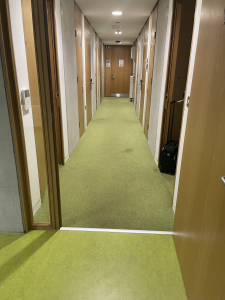 The craziest thing is, there is quaint accommodation on campus, it’s just on the opposite side of campus, the pretty side. The side we live on is modern. Iron and glass everywhere. Abstract sculptures, geometric shapes, the whole bag. Then all you have to do is cross the road that splits the campus in half, and suddenly you are in picturesque Ireland – large, moss-covered stone buildings, a massive Gothic church, and a beautiful, green courtyard. Below is a picture of the casual beauty that I encounter when I cross the road on my afternoon runs. (Psst, there’s a picture of the church if you scroll down). A perfect example of a juxtaposition. Wow, 11th-grade honors English class is coming in clutch for the big words today.
The craziest thing is, there is quaint accommodation on campus, it’s just on the opposite side of campus, the pretty side. The side we live on is modern. Iron and glass everywhere. Abstract sculptures, geometric shapes, the whole bag. Then all you have to do is cross the road that splits the campus in half, and suddenly you are in picturesque Ireland – large, moss-covered stone buildings, a massive Gothic church, and a beautiful, green courtyard. Below is a picture of the casual beauty that I encounter when I cross the road on my afternoon runs. (Psst, there’s a picture of the church if you scroll down). A perfect example of a juxtaposition. Wow, 11th-grade honors English class is coming in clutch for the big words today. 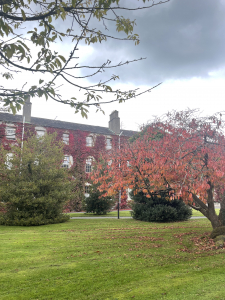
ANYWHO, I’m getting carried away, per usual. I truly can’t complain about my apartment. It’s located on campus and only around a five-minute walk to any of my classes, a 10-minute walk to the shopping center, and 20-minute walk to the train station. It’s what real estate agents would call “prime property”. I like to think that its lack of character makes the bare minimum effort that my flatmates and I put into decorating it look amazing. We have already arrayed one wall with some beautiful self-portraits, and week-old flowers are currently living in an old pasta sauce jar on our kitchen table. Yeah, we’re classy around here.
As for my own room, I will stick to minimal decoration as I do not want to have a lot of things to deal with at the end of the semester, as I’m trying to pack for my flight back. As compared to MLC, it is grand. I have my own FULL bathroom connected to my room. Gone are the days of scampering down the hallway in a towel on the way to the shower. Along with that, there is plenty of storage space, which is completely wasted on me currently, as I am living as a vagrant. Not sharing a room and sleeping under someone else has also been an amazing luxury. Not that I don’t enjoy having a roommate to keep me sane, shout out to Heather, but it is a breath of fresh air to feel a sense of independence after living in a dorm for so many years.
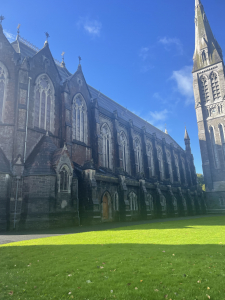 Unfortunately, with independence comes maintenance, namely cleaning, which my flatmates and I have found to be frustrating as hair seems to collect so quickly and the bread here seems to be so crumbly. Maybe the lime green just makes it more obvious, who knows? While we’re on the topic of first-world problems, making my own food sounds all fine and dandy until I actually have to go and buy groceries and walk them back home. For those wondering, a backpack is always the way to go. Independence also requires self-regulation and motivation, which is easy to slack on when you have the option of rotting in your room without anyone knowing or saying a word. Those are the times that I have to remind myself that I am in IRELAND and that I should make the most of the time that I’m here. Luckily for me, my flatmates think the same way.
Unfortunately, with independence comes maintenance, namely cleaning, which my flatmates and I have found to be frustrating as hair seems to collect so quickly and the bread here seems to be so crumbly. Maybe the lime green just makes it more obvious, who knows? While we’re on the topic of first-world problems, making my own food sounds all fine and dandy until I actually have to go and buy groceries and walk them back home. For those wondering, a backpack is always the way to go. Independence also requires self-regulation and motivation, which is easy to slack on when you have the option of rotting in your room without anyone knowing or saying a word. Those are the times that I have to remind myself that I am in IRELAND and that I should make the most of the time that I’m here. Luckily for me, my flatmates think the same way.
Ah! What a natural segue into talking about said flatmates. All four of them are from the US, but from different parts of the country. Michigan, New Jersey, California, and Kentucky. We are all very different, yet we somehow manage to get along very well. As I mentioned in my last blog, we have had to find familiarity with each other fairly quickly. We’ve all made the unspoken choice to stick together and are even getting to a point where we can actually be vulnerable with each other. I’ve had interesting conversations with each of them already, and I look forward to the adventures that we will go on together. A trip to London is currently in the works, which will definitely shake out to be the weekend of a lifetime.
Well, now is the time in the show that I must bid adieu as I must run to class, but just know that I am very much enjoying my time abroad. I really don’t mind the crumbly bread. It’s actually much better than any bread that I’ve ever eaten in the caf. Yes, that was subtle shade. Oh, also, my apologies for all of the dramatics throughout this entry; it’s been a week. Ok, I actually have to go now. Classes here may start five minutes later than the appointed time, but I don’t want to be the person who makes people have to stand up, so I can get a middle seat in the lecture hall. Until next time!
Peace and Love,
Mathilde
Blog #3 Village Vibes: Studying and Staying in Limerick
/in Limerick, Ireland Fall 2025 KopplinDia duit! Hello! And Good Day! (pronounced dee-uh g-witch)
It has been just about a month of living in Ireland! You may be wondering if there are dorms on campus or if I live with a host family. What is the housing accommodation like? I live in the Plassey Residence Village, which is pretty much a small apartment complex. There are a few different villages all around campus to accommodate all the students. Each village is comprised of small apartments, each with its own door to the outside. Plassey Village is only about a 15-minute walk to the center of campus and most of my classes. This is pretty typical for all the villages. Each apartment houses 4, 6, or 8 people. My apartment holds 4 bedrooms, each with a twin bed with storage drawers underneath, a desk and chair, a wardrobe, and a sink with cabinet space. We also have a shared living space with a couch, TV, dining table and chairs, and a kitchen.
I live with 3 other lovely ladies—Katie, Nessa, and Eli. We love living together this semester, and I couldn’t be happier with how my housing arrangements turned out. We’ve settled into a routine in the evenings of making dinner and watching a few episodes of Gilmore Girls. I love getting to experiment in the kitchen that I only share with 3 girls instead of an entire dormitory. Friday nights are pizza and movie nights for Katie and me, and we look forward to them every week!
We have a routine of going shopping together each weekend. We make a list of places we need to visit, such as the Milk Market (a farmers’ market), Savvas Music store for Irish tin whistles, Dunnes for groceries or clothes, Penny’s for clothes, Michael Guiney’s for kitchen things, and a local shop for a sweet treat or coffee! We plan our day and make our shopping lists. We check the 304 and 304A bus routes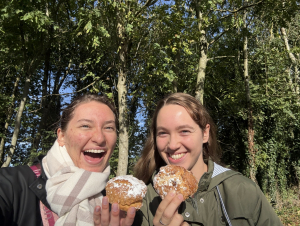 and times (always estimated as it’s usually late). We spend the morning or most of the day in town, making Dunnes our last stop for groceries before catching the bus back to the village.
and times (always estimated as it’s usually late). We spend the morning or most of the day in town, making Dunnes our last stop for groceries before catching the bus back to the village.
As the University of Limerick hosts 18,000+ students, there are quite a few differences between MLC and its 600+ students. The laundry room in my village has 3 washers and 3 dryers for 40+ apartments. MLC provides 8 washers and 8 dryers in the Augustana dormitory for 190+ girls. There are 2 bathrooms in my apartment, shared between 4 girls. Augustana contains 1 large bathroom with 6 toilets and showers, and 10 sinks for an entire floor of girls.
I live in a village called Plassey,
The weather is not too nasty. 🌦️🌈
With Nessa and Eli, and Katie,
We four girls live steady.
We are all pretty classy.
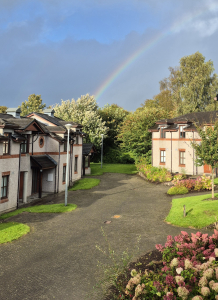
In the village four girls live.
Many memories we give.
Apartments are vast.
But we all will last.
Our kitchen has no sieve.
Dishes and plates we had.
Upon our arrival, we were glad.
To the store we must go.
And tote bags in tow.
The bus with us and our cargo.
Four bedrooms for four.
We have lots of doors.
Twelve you see

And this must be
For we have things to store.
To Guiney’s we shall ‘venture,
For I must have a blender.
Soup I want to create
But puree need to make.
This has brought me much splendor.
Studying and staying in Limerick,
It must be considered a picnic.
Little friends do we see, 🕷️
That should be in a tree. 🐝
Our kitchen has tiny sidekicks.
There are too many good songs to choose from, so here are two!
Irish Pub Song, by The High Kings: https://youtu.be/bp3UsU5pQT8?si=qQ8SZcD7cdcTPccb
Hills of Connemara, by Gaelic Storm: https://youtu.be/rREMPw8U2No?si=3iKjg-4H-7AVBVi9
Blog 3 – Classy Plassey
/in Limerick, Ireland Fall 2025 GilkeyHappy day, friends!
Holi cannoli! Can you believe it? I have been living in Ireland for a month, and may I say, I still love it just as much as I did when I got here the very first day! The living arrangements certainly help to make me feel at home, which is what I am thrilled to share with you in this blog! Thank you for your kindness in reading this, and I hope that it makes you thankful for the home that God has blessed you with!
Speaking of “thankful”, I find myself silently thanking God for so many things every day! I really do believe that positivity is healing, and my gratitudes have kept me full of joy, even when harder moments have occurred! Here are some of my gratitudes from these past few weeks!
Three things I am grateful for:
- Irish Dancing (it is a tremendously beautiful way to move the body)
- My Housemates (we go on adventures all the time, make memories, have ‘Gilmore Girls’ dinner nights, laugh, and just have loads of fun together)
- Walking (it is such a blessing to have the ability to walk, to take in everything around, and enjoy physical activity in such a unique/individualized manner)
My prompt for this blog focuses on my living arrangements in Limerick, and I am excited to share with you how I have made what could be seen as grotesque into something that has become home!
My Accommodations:
- I live on campus.
- I live in a village.
- I live with three gals and many bugs.
- I live in a much more individualized environment than the housing at MLC.
I don’t know if your brain is like this or not, but I most certainly am someone who needs to visualize my living space prior to arrival. Throughout my years of living in dorms, I always had a freak-out moment sometime in the summer when I needed to know exactly where my new room would be, what the setup would be, what my window would look out at, etc. I just like to have a game plan of how to make my new environment look like home and what I would want to pack to make it feel like home, you know?! Anyway, I had my annual-summer-mental-new-housing freak-out moment prior to coming to Ireland, and I decided to look up on the UL website what the housing arrangements looked like. I began to feel better about what I was seeing until I realized that there are 6 on-campus villages and 3 off-campus villages, and I did not know which village I would be living in! Umm, guys, that was a mega problem on aisle nine! But don’t fret…I figured it out! 😁
It just so happens that I have the incredible opportunity to live in Plassey Village, which is technically on campus, but the village is located just outside of the campus flagpoles. The village is filled with little houses that are connected together and placed along little stone streets. I totally feel like the outside aesthetic of the houses gives epic fairytale vibes! Hehe…sometimes I feel like Snow White walking to my cottage, trying to take shelter from a ton of rain! However, I do have to walk a fair distance to get to important places on campus. For example, for me to walk to the center of campus, I have to walk about 0.6 miles. For me to walk to any of my Irish dance classes, I have to walk about 1 mile (one direction). Needless to say, I am grateful for the ability to walk and for the time that I get to pray or be in deep thought as I make my way around campus!
I am truly blessed. I have the opportunity to live with three amazing gals: Laura, Vanessa, and Eli! God is just so good! We all get along wonderfully, respect one another, have classes together, and love going on adventures together! I couldn’t ask for a better group of people to live with and to call my friends! The amount of love and support that we are able to give to one another fills my cup with so much joy!
We do, however, have a few other friends that like to live with us as well…bees and spiders! We often find our flying friends in the kitchen with us, and I have learned to enjoy their spritely company as they buzz around the air and I buzz around making food! Our 8-legged friends, on the other hand, are much less liked. They come in a variety of sizes and are smashingly good at surprising us when we least expect it! 🙃 Most of the time, I freak out when there is a spider, and I could not be more thankful for Laura’s prompt and speedy spider-attacking abilities! Do not worry, though, we have now found a solution that has helped…peppermint oil on cotton balls! This leads to fewer emotional attacks on us and fewer physical attacks on the spiders. If you have a problem with this yourself, I highly recommend this tactic – “it is so choice”! I do still have one webbed friend that likes to live above my closet, but we have compromised. I have agreed to let him cohabitate in my room as long as he doesn’t move – we will see how long this lasts…
Aside from my new friends and fairytale housing, it is pretty independent living. I have my own room with my own sink! Side note…this is a brilliant idea to have a sink in the room! It makes getting ready in the morning and at night SO much easier! Then, Vanessa and I share a bathroom on the second floor, and Laura and Eli have their rooms and bathroom on the first floor. Together, we share a kitchen and living room space on the second floor! We have the best times cooking and watching “Gilmore Girls” on the couch! This is much different from MLC, as we have individual rooms, only share a bathroom with one other person, have a sink in our rooms, only live in a building with four people total, cook for ourselves, and are fully responsible for our own lives with no one checking in on us. The one thing that is like MLC is the laundry room. We have one laundry room with three washers and three dryers for the entire village. I have had one too many kerfuffles while trying to do laundry here, and I miss having more machines and dryers – thank you MLC for providing machines that work a lot better than these! As usual, I am still VERY careful to not get concussed on the dryer door again…
Overall, the living conditions are wonderful and I have put up Bible verses all over my room for decoration! It makes me feel so at home and I love having some space to myself! I thank God for allowing me to experience a more independent lifestyle where I can learn responsibilities that I would not get at MLC!
These past few weeks have been extremely busy, but filled with so much life and vibrancy! Each day is a beautiful continuation of the day before and presents opportunities to talk to new people and form connections around the globe! There are an abundance of activities to do, places to serve, and people to interact with. Life here is real, raw, and ravishing.
Highlights of my month in Ireland include:
- I was accepted into the UL Global Ambassador’s Programme (I will be writing more blogs and hopefully making yoga/pilates videos to be posted on UL social media)
- Visiting Bunratty Castle and the Ring of Kerry (absolutely stunning sites)
- Joining the Environmental Society
- Beginning Irish Dance Classes (it is SO much harder than it looks)
- Seeing the amazing ways that Ireland stresses caring for the environment (sorting trash, litter picking, recycling bottles at the store, using reusable cups/bags, using paper towels that are on a roll and are fabric, etc.)
- Teaching a lesson on past and present tense on the spot in my TESOL (Teaching English to Speakers of Other Languages) class
Low-lights of my month in Ireland include:
- Feeling very isolated and out of place in particular environments
- Getting on the wrong bus
- Pain with dancing
Learned Insights from the Low-lights:
- Though there are particular moments of isolation or feeling like I don’t belong, these are the moments that provide me with opportunities to step out of my comfort zone and try to talk to people that I might not normally speak with! These are the moments that help to build my character, confidence, and my ever-growing perspective!
- There was a moment that my housemates and I got on the correct bus, but it was going the wrong direction. So, we had to stay on it for over an hour before the loop turned around and we could get back home! What was amazing about this experience was that we got to see all of Limerick and better familiarize ourselves with landmarks around the city! We also had the opportunity to meet a lovely lady who gave us lots of tips of beautiful places to visit while we are here! Truly a God wink!
- It has been hard on my body to learn Irish Dancing. It is an exquisite way to move one’s body, but with my back and hip issues, I have been undergoing quite a bit of pain to dance in this manner. But I am finding joy in working on moving with a bit less passion so as not to aggravate my body further! This is something that will ultimately be a beneficial thing for me to learn as I continue to further my knowledge of living life with physical constraints.
Scripture that has been close to my heart these past few days:
- 1 John 5:12 – “Whoever has the Son has life; whoever does not have the Son of God does not have life.”
- 1 John 1:8-9 – “If we claim to be without sin, we deceive ourselves and the truth is not in us. If we confess our sins, he is faithful and just and will forgive us our sins and purify us from all unrighteousness.”
- John 14:6 – “Jesus answered, ‘I am the way and the truth and the life. No one comes to the Father except through me.’”
With that, I have shared with you what has been on my heart and in my mind! This is a charming place and I am so grateful to be calling Plassey Village my home! God is so good and has been blessing every moment with His graces and mercies! Praise be to Him who forgives, loves, and gives eternal life!
Many blessings to you now and always,
Katie Gilkey


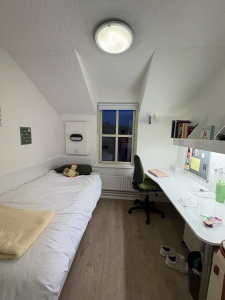
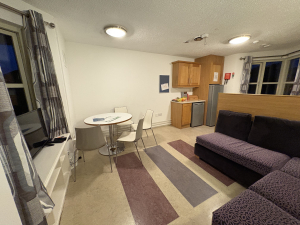
Home Away From Home
/in Berlin, Germany Fall 2025 MunsonHaving a host family in Germany was something that before I arrived made me both very excited and nervous. Would they like me? Would I like them? Would they be friendly? Would they want to spend time with me?
However, after spending a little over a month with them so far, I can happily say that having a host family was one of the best decisions of my study abroad experience. As soon as I arrived I was greeted by my host mother, who gave me a hug and welcomed me into her home. Soon enough, I found myself settling in and spending time with them at meals and when I was at their house.
Their flat/apartment is in a well kept building about 25 minutes from the city center by train. I often enjoy taking that train to the city center and walking around, not to a specific place but just because I can. I still find it hard to believe when I round the corner coming out of the underground train station and see the Brandenburg Gate right there in front of me. At my host family’s house, I also have my own room and bathroom which is really nice. Pictured above is my room. Having that space to myself has been really awesome, and is something that I definitely would not have gotten if I had done a dorm type living arrangement.
Another thing that I think is awesome is breakfast and dinner. Both of those are covered by my host family, and not having that extra stress of having to find meals has been very useful and beneficial. (And they make really good food too!)
On a somewhat related note, something I’ve taken away from these experiences, especially around meals, is the way they have dinner. Having that time and really intentionally slowing down has been really nice for me. My host family makes a big point to be present in the moment during these times and everyone genuinely shares how their day was. At first, I was nervous for when I’d have to share my day (partially because I’d be saying it in German) but they those moments have quickly become some of my favorite and are a great way to practice my German in what is a very safe space.
Overall, I really enjoy my living arrangements and host family. There are many aspects of their life that I admire. Dinner has quickly become a highlight of my day because I get to sit and talk with my host family. It’s really nice that they are very invested in how my day was and are willing to help me with any questions I have. Having that family feel is another thing I really appreciate.
I have a host brother (18) and a host sister (22) who are both close in age to me, so talking with them feels very natural and I have really enjoyed getting to know them. I hope to continue spending time with them and getting to know them.

